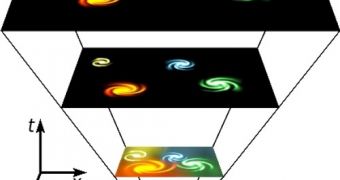According to astronomical predictions, astronomers looking at the skies in the distant future will have the distinct impression that the Milky Way is the only galaxy in the Universe, as the force known as dark energy will completely erase the Big Bang's fading signal, and will push other collections of star systems very far away from each other. Thus, the Universe will reach such a mind-boggling size, that directly observing other galaxies will be next to impossible.
This will have severe repercussions on the science of astronomy in the years to come, simply because, lacking reference points, scientists will not be able to observe the motion of the galaxies, and the complex interactions that occur between these formations. Leftover radiation, which was generated when the Universe first popped into existence, will also be hidden, so basically future researchers will literally be left without any sort of bearings. The only thing they will be able to notice will be what's going on inside our own star system.
The predictions say that dark energy will soon accelerate regular matter to such speed, that it will be pushed apart faster than the speed of light, which means that it would be physically impossible for even the most scientifically-advanced observatory to see anything. “Nothing can move through space faster than the speed of light, but space can do whatever the hell it wants as far as we know,” Lawrence Krauss, a cosmologist at the Arizona State University, told at the annual American Association for the Advancement of Science (AAAS) meeting, held in Chicago last week.
“When that happens, they carry objects with them, like a surfer on a wave. The light from those objects cannot reach us. So, eventually the universe will disappear before our eyes,” he told Irene Klotz of Discovery Channel, in a private interview, emphasizing the fact that portions of our Universe were already accelerating and moving out of sight even at that point.
Of course, by the time dark energy takes over, the Earth will be long since extinct, as the Sun will expand in about 5 billion years. But civilizations living elsewhere in the galaxy, or in any other similar star aggregate, could face the exact same problem. “It's perfectly reasonable to expect that there will be civilizations not that different than our own that could arise, but they will live in an empty, dark universe,” the scientist concluded.

 14 DAY TRIAL //
14 DAY TRIAL //